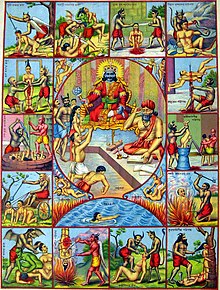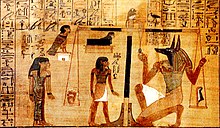
The afterlife or life after death is a purported existence in which the essential part of an individual's stream of consciousness or identity continues to exist after the death of their physical body. The surviving essential aspect varies between belief systems; it may be some partial element, or the entire soul or spirit, which carries with it one's personal identity.
Islamic eschatology is a field of study in Islam concerning future events that would happen in the end times. It is primarily based on sources from the Quran and Sunnah. Aspects from this field of study include the signs of the final age, the destruction of the universe and Judgement Day.
Pre-existence, preexistence, beforelife, or premortal existence, is the belief that each individual human soul existed before mortal conception, and at some point before birth enters or is placed into the body. Concepts of pre-existence can encompass either the belief that the soul came into existence at some time prior to conception or the belief that the soul is eternal. Alternative positions are traducianism and creationism, which both hold that the individual human soul does not come into existence until conception or later. It is to be distinguished from preformation, which is about physical existence and applies to all living things.

Yama is the Hindu deity of death, dharma, the south direction, and the underworld. Belonging to an early stratum of Rigvedic Hindu deities, Yama is said to have been the first mortal who died in the Vedas. By virtue of precedence, he became the ruler of the departed.

Naraka is the realm of hell in Indian religions. According to some schools of Hinduism, Jainism and Buddhism, Naraka is a place of torment. The word Neraka in Indonesian and Malaysian has also been used to describe the Islamic concept of Hell.
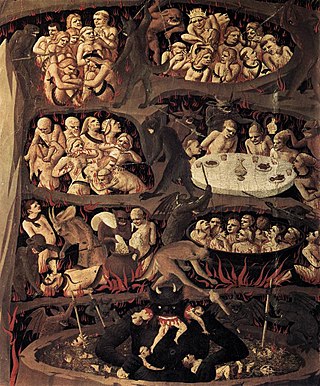
Damnation is the concept of divine punishment and torment in an afterlife for actions that were committed, or in some cases, not committed on Earth.

The Last Judgment, Final Judgment, Day of Reckoning, Day of Judgment, Judgment Day, Doomsday, Day of Resurrection or The Day of the Lord is a concept found across the Abrahamic religions and the Frashokereti of Zoroastrianism.
The problem of Hell is an ethical problem in the Abrahamic religions of Christianity, Islam and Judaism, in which the existence of Hell (Jahannam) for the punishment of souls in the Afterlife is regarded as inconsistent with the notion of a just, moral, and omnipotent, omnibenevolent, omniscient supreme being. Also regarded as inconsistent with such a just being is the combination of human free will, and the divine qualities of omniscience and omnipotence, as this would mean God would determine everything that has happened and will happen in the universe—including sinful human behavior.
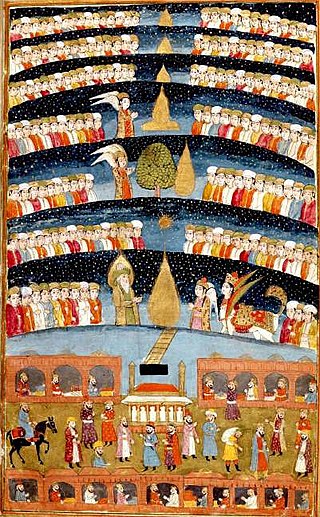
In Islam, Jannah is the final abode of the righteous. According to one count, the word appears 147 times in the Qur'an. Belief in the afterlife is one of the six articles of faith in Sunni and Twelver Shi'ism and is a place in which "believers" (Mumin) will enjoy pleasure, while the unbelievers (Kafir) will suffer in Jahannam. Both Jannah and Jahannam are believed to have several levels. In the case of Jannah, the higher levels are more desirable, and in the case of Jahannam, the lower levels have a higher level of punishments. — in Jannah the higher the prestige and pleasure, in Jahannam the severity of the suffering. The afterlife experiences are described as physical, psychic and spiritual.
In Islam, Jahannam is the place of punishment for unbelievers and evildoers in the afterlife, or hell. This notion is an integral part of Islamic theology, and has occupied an important place in the Muslim belief. It is often called by the proper name Jahannam. However, "Jahannam" is simultaneously a term specifically for the uppermost layer of Hell.
al-Ākhirah is an Arabic term for "the Hereafter".
Justice is a central theme in the Qur’an, dictating the traditions of law and how they should be put into practice. There are two ways in which justice operates: in a legal sense and in a divine sense. Regarding justice in the legal sense, the Qur’an tells Muslims not only how to conduct themselves, but is also highly important regarding relationships with other people. It states what the various punishments for certain crimes should be along with the justification behind this reasoning. Furthermore, the Qur’an brings across the idea that anyone who propagates the message of justice and acts accordingly will be justly rewarded with their place in jannah. With regard to divine justice, there has been a discourse between many commentators debating how justice will be fulfilled for different people, although all agree that Allah shall not do any injustice. It is debated as to how justice regarding non-Muslims functions. Although Qur'an is not direct on justice for non-Muslims but on three occasions this book clearly enunciates that the good deeds of the humans belonging to other religious backgrounds are not to be wasted before Allah., and from these verses, it can be inferred directly that Creator i.e. Allah has nothing to do with religious background but the good deeds of the actor will always be rewarded both in this world and hereafter too, enshrining the justice for all by Allah.

In religion and folklore, hell is a location or state in the afterlife in which souls are subjected to punitive suffering, most often through torture, as punishment after death. Religions with a linear divine history often depict hells as eternal destinations, the biggest examples of which are Christianity and Islam, whereas religions with reincarnation usually depict a hell as an intermediary period between incarnations, as is the case in the Indian religions. Religions typically locate hell in another dimension or under Earth's surface. Other afterlife destinations include heaven, paradise, purgatory, limbo, and the underworld.

Divine judgment means the judgment of God or other supreme beings and deities within a religion or a spiritual belief.
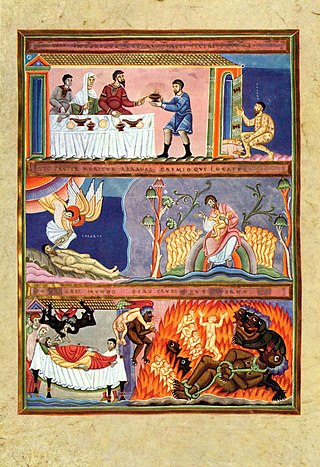
Hades, according to various Christian denominations, is "the place or state of departed spirits", borrowing the name of Hades, the Greek god of the underworld. It is often associated with the Jewish concept of Sheol.

In some forms of Christianity the intermediate state or interim state is a person's existence between death and the universal resurrection. In addition, there are beliefs in a particular judgment right after death and a general judgment or last judgment after the resurrection. It bears resemblance to the Barzakh in Islam.
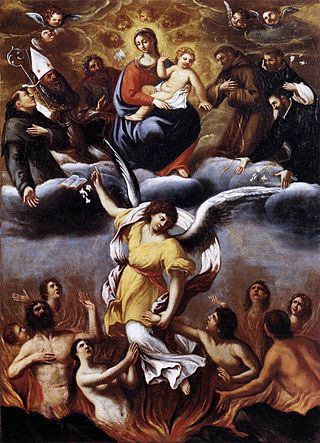
Purgatory is a passing intermediate state after physical death for purifying or purging a soul. A common analogy is dross being removed from metal in a furnace.

Naraka, also called Yamaloka, is the Hindu equivalent of Hell, where sinners are tormented after death. It is also the abode of Yama, the god of Death. It is described as located in the south of the universe and beneath the earth.
Death in Islam is the termination of worldly life and the beginning of afterlife. Death is seen as the separation of the soul from the human body, and its transfer from this world to the afterlife.
In Islam, "the promise and threat" of Judgement Day, is when "all bodies will be resurrected" from the dead, and "all people" are "called to account" for their deeds and their faith during their life on Earth. It has been called "the dominant message" of the holy book of Islam, the Quran, and resurrection and judgement the two themes "central to the understanding of Islamic eschatology." Judgement Day is considered a fundamental tenet of faith by all Muslims, and one of the six articles of Islamic faith.
